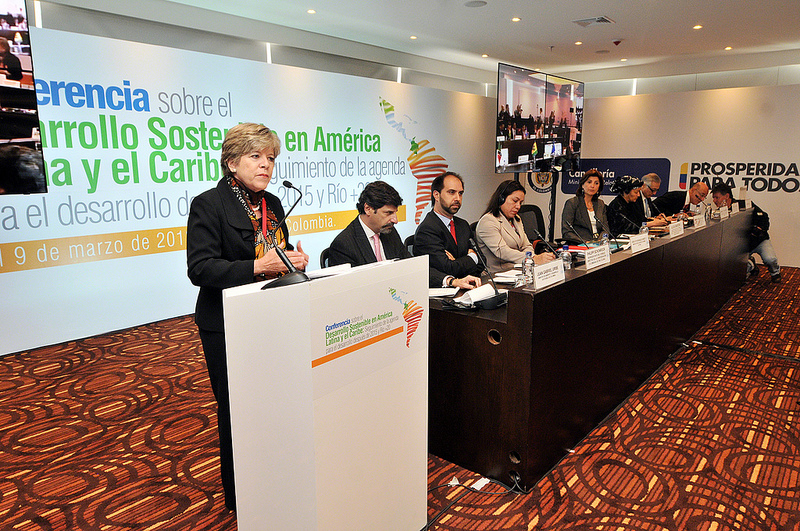Equality and Environmental Sustainability Are at the Heart of the Post-2015 Development Agenda
Work area(s)
Latin American and Caribbean countries meet to assess progress towards achieving MDGs and Rio+20 agreements.

Follow the conference webstreaming
(7 March 2013) Today, authorities from several Latin American countries and international experts opened the Conference on Sustainable Development in Latin America and the Caribbean: Follow-up to the development agenda beyond 2015 and Rio+20 , which is being held from 7 to 9 March in Bogotá, Colombia.
At the opening of the meeting, which is organized by the Government of Colombia and the Economic Commission for Latin America and the Caribbean (ECLAC) and attended by all United Nations agencies in the region, participants agreed that a more ambitious post-2015 development agenda was needed to promote growth with greater inclusion, protection, social equality and environmental sustainability.
They also called for efforts to reduce exposure to the negative impact of external volatility, greater levels of productive investment, increased creation of decent and quality jobs, reduced environmental pressure and resilience in the face of disasters.
The meeting is intended as the first step towards using a regional perspective to examine progress towards achieving the Millennium Development Goals (MDGs) and the post-2015 development agenda, as well as the agreements adopted following the United Nations Conference on Sustainable Development (Rio+20) in June 2012. The meeting was opened by María Ángela Holguín, Minister of Foreign Affairs of Colombia, who highlighted the importance of such topics for the entire region.
"We must focuse on the big emerging global challenges of today. It's not enough to simply agree on a new version of the MDGs. The world has changed in unsuspected ways during the last 15 years and is impossible to foresee where will us be in 15 year's time, or even beyond that", Minister Holguín declared.
Alicia Bárcena, Executive Secretary of ECLAC, pointed out that "Achieving the MDGs is essential, but they alone are not enough to guide development towards sustainability. This requires a structural change with equality, based on better production and consumption patterns".
Heraldo Muñoz, Chair of the United Nations Development Group - Latin America and the Caribbean (UNDG-LAC), stated that it is vital to avoid the imposition of a development agenda "from above". "There's a need to include the voices of everyone and answer the emerging issues, such as civil insecurity, violence, environment, climate change, among others", he said.
Carolyn Rodrigues-Birkett, Minister of Foreign Affairs of Guyana, speaking at the opening session declared that "if we are going to succeed in the post-2015 development agenda, all segments of society must participate, especially those more vulnerable".
Amina J. Mohammed, Special Advisor of the UN Secretary-General on Post-2015 Development Planning, stated that "We need a coherent global development agenda post- 2015 that integrates people and planet", while Philipp Schönrock, Representative of the Management Board of the Colombian Federation of NGOs, emphasized that civil society is a well recognized player in the post-2015 agenda process.
The first session, which was chaired by Minister María Ángela Holguín, involved Gisela Alonso and Patricia Espinosa, members of the High-level Panel on the Post-2015 Development Agenda, set up in July 2012, Amina J. Mohammed, and civil society representatives.
The inter-agency document Sustainable development in Latin America and the Caribbean: Follow-up to the United Nations post-2015 development agenda beyond 2015 and Rio+20 was presented on the first day to identify the region's remaining challenges in achieving the Millennium Development Goals (MDGs) and to suggest future guidelines. The publication includes contributions from 17 United Nations agencies in the region, and was coordinated by ECLAC.
According to the main findings of the document, facing the challenges requires a new development model based on structural change for equality and environmental sustainability. According to the report, the region is changing and the minimum threshold for well-being has risen. This is reflected in State policies with a universal vocation (social protection, health, education and employment), with rights and quality.
The report also states that policy and institutions are important, and that the change towards sustainable development requires appropriate signals in terms of regulation, taxation, financing and governance of natural resources.
The study suggests moving towards more varied ways of measuring progress to prevent GDP from being the only indicator for quantifying human progress. Developing multidimensional methodologies for measuring well-being, poverty, education and health quality, inequality and economic activities is vital for the post-2015 agenda.
The document indicates that global governance for sustainable development must be based on fair trade, technology transfer, international financial reforms and new funding mechanisms, the development of South-South cooperation and the strengthening of social participation mechanisms.
The conference was preceded by the Caribbean Forum: Shaping a Sustainable Development Agenda to address the Caribbean Reality in the 21st Century, which was also held in Bogotá on 5 and 6 March.
This event was attended by, among others, Carolyn Rodrigues-Birkett, Minister of Foreign Affairs of Guyana and Chair of the Caribbean Development and Cooperation Committee (CDCC) - which is a subsidiary body of ECLAC -, Pati Londoño, Vice-Minister for International Affairs of Colombia, Irwin Larocque, Secretary-General of the Caribbean Community (CARICOM), Arnaldo Brown, Minister of State in the Ministry of Foreign Affairs and Foreign Trade of Jamaica, and Winston Dookeran, Minister of Foreign Affairs of Trinidad and Tobago.
The media are invited to cover the Conference on Sustainable Development in Latin America and the Caribbean, which is being held in the Crowne Plaza Tequendama Hotel, in Bogotá, Colombia.
For more information, please visit the ECLAC website.
Any queries should be sent to the ECLAC Public Information and Web Services Section in Santiago, Chile.
E-mail: prensa@cepal.org; Telephone: (56 2) 2210 2040.
Follow us on: Twitter, Facebook, Flickr and YouTube.
Related content

Authorities and Experts Call for a Global, Unified, Comprehensive and Equitable Post-2015 Development Agenda
Latin American and Caribbean countries met to assess progress in achieving the Millennium Development Goals and the Rio+20 agreements.
Country(ies)
- Latin America and the Caribbean
Contact
Public Information Unit
- prensa@cepal.org
- (56 2) 2210 2040